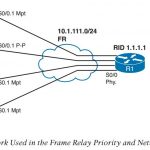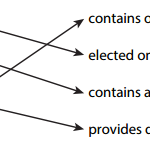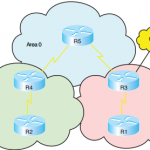CCIE Routing and Switching FAQ: OSPF Q1. R1 has received an OSPF LSU from R2. Which of the following methods can be used by R1 to acknowledge receipt of the LSU from R2? A. TCP on R1 acknowledges using the TCP Acknowledgment field. B. R1 sends back an identical copy of the LSU. C. R1 sends back an LSAck to R2. D. R1 sends back a DD packet with LSA headers whose … [Read more...]
CCNA FAQ: OSPF
CCNA FAQ: OSPF Q1. Which of the following affects the calculation of OSPF routes when all possible default values are used? a. Bandwidth b. Delay c. Load d. Reliability e. MTU f. Hop count Answer: A. OSPF calculates metrics based on the cost associated with each interface. OSPF, by default, calculates interface cost based on the bandwidth setting. Q2. OSPF runs an … [Read more...]
CCDA FAQ: OSPF, BGP, Route Manipulation, and IP Multicast
CCDA FAQ: OSPF, BGP, Route Manipulation, and IP Multicast Q1. True or false: A router needs to have all its interfaces in Area 0 to be considered an OSPF backbone router. Answer: False. A router with one or more interfaces in Area 0 is considered an OSPF backbone router. Q2. True or false: OSPF IS-IS uses a designated router in multiaccess networks. Answer: True Q3. Which … [Read more...]
OSPF
OSPF Objective: Configure, verify, and troubleshoot OSPF The most widely used link-state routing protocol today is an IETF standard routing protocol called Open Shortest Path First (OSPF). Developed in 1988, this routing protocol was created to overcome the limitations that RIP presented for large-scale networks. The following sections look at the fundamentals of OSPF … [Read more...]
CCNP Route Notes OSPF
CCNP Route Notes OSPF OSPF Overview OSPF is an open-standard, classless routing protocol that converges quickly and uses cost as a metric. (Cisco IOS automatically associates cost with bandwidth.) OSPF is a link-state routing protocol and uses Dijkstra’s Shortest Path First (SPF) algorithm to determine its best path to each network. The first responsibility of a … [Read more...]
When configuring OSPF in a VRF for Customer routes
When configuring OSPF in a VRF for Customer routes you need to be aware that the VRF will create the OSPF instance as an ABR (Area Boarder Router) When OSPF is configured in a VRF it will be created as an ABR. This may prevent summary and external routes from being put in the VRF routing table when OSPF is not part of Area 0 For example if you configure the VRF with OSPF … [Read more...]
OSPF: Behavior of the default route that an ABR advertise to a stub area when the ABR is set to overload.
OSPF: Behavior of the default route that an ABR advertise to a stub area when the ABR is set to overload. The router will not poison the default route metric after the router became overload. Example Show route taken from a OSPF stub router before the ABR is set to overload. # run show route inet.0: 14 destinations, 14 routes (14 active, 0 holddown, 0 hidden) + = … [Read more...]
Hidden OSPF/IS-IS routes appear in inet.3 when LDP tunneling is enabled on RSVP LSPs
When LDP is tunneled over RSVP LSPs, hidden OSPF and/or IS-IS routes appear in inet.3. This is normal behavior for LDP tunneling due to stealth IGP shortcuts (shortcuts that have not been explicitly configured). Assume the following network diagram: PE1(10.0.0.81)---P1(10.0.0.82)-----P2(10.0.0.83)----PE2(10.0.0.84) … [Read more...]
OSPF ‘authentication-type’ deprecated or showing as hidden on different versions.
OSPF 'authentication-type' deprecated or showing as hidden on different versions. In different versions of Junos OS, the command authentication-type shows a warning that it is deprecated, or else when trying to configure it, the command is not even shown as available. Use of the context-sensitive help command ("?") does not show the command either. This article will explain … [Read more...]
RPD_OSPF_NBRDOWN
RPD_OSPF_NBRDOWN An OSPF adjacency with the indicated neighboring router was terminated. The local router no longer exchanges routing information with, or directs traffic to, the neighboring router. This message is generated by the routing protocol process (rpd) which controls the routing protocols that run on the router. The RPD_OSPF_NBRDOWN message is logged each time an … [Read more...]


